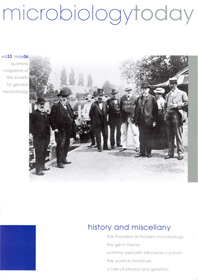History and Miscellany
01 May 2006 publication
The lead articles of the May 2006 issue of Microbiology Today are on the founders of modern microbiology; the germ theory; wartime penicillin still packs a punch; the world in miniature; and a tale of physics and genetics.
The founders of modern microbiology - the 1891 London Congress of Hygiene and Demography (p. 54)
Philip Mortimer discusses just who was who in microbiology at the end of the 19th century?
The fossil hunter, Queen Victoria's doctor and the germ theory of disease (p. 58)
Milton Wainwright reveals that long before Pasteur described his ideas, others speculated that microscopic organisms might cause disease.
Wartime penicillin still packing a punch (p. 62)
Eric Sidebottom, Alan Smith, Neil Stokes and Jeff Errington explain how surprisingly, some antibiotic tablets are still potent after 60 years.
The world in miniature: sealed ecosystems (p. 64)
How long can life persist? Peter Sneath and Dave Roberts suggest that maybe these tubes contain the answer.
Bacterial swarming: a tale of physics and genetics (p. 68)
I. Barry Holland, Daria Julkowska, Kassem Hamze and Simone Séror think it's amazing how some bacteria are capable of mass migration.
International Research Grant report (p. 72)
Nicholas Johnson discusses the molecular epidemiology of European bat lyssavirus 1.
Schoolzone (p. 76)
Dariel Burdass takes a look at some important discoveries in medical microbiology and the scientists behind them.
Gradline (p. 78)
Jane Westwell offers advice to postdocs who plan to go into the commercial sector, and talks to Neil Stokes, the Principal Scientist at Prolysis Limited.
Going public (p. 82)
Faye Stokes describes her experience at the Microbiology Awareness Campaign event in March, at the National Assembly for Wales.
Comment - Chronicling microbiology (p. 88)
Michael Worboys believes the history of microbiology is important but researching the subject is not that easy.

